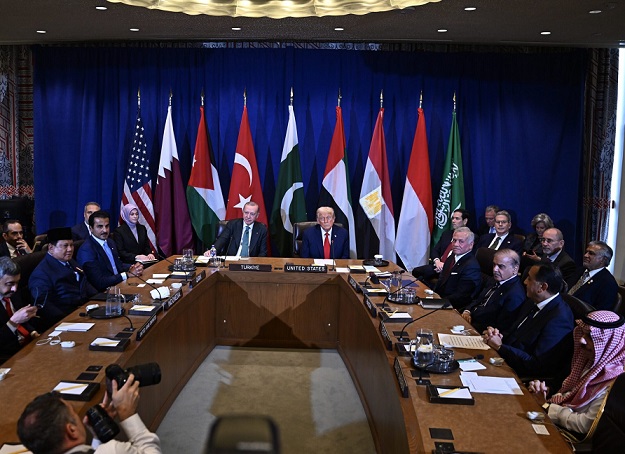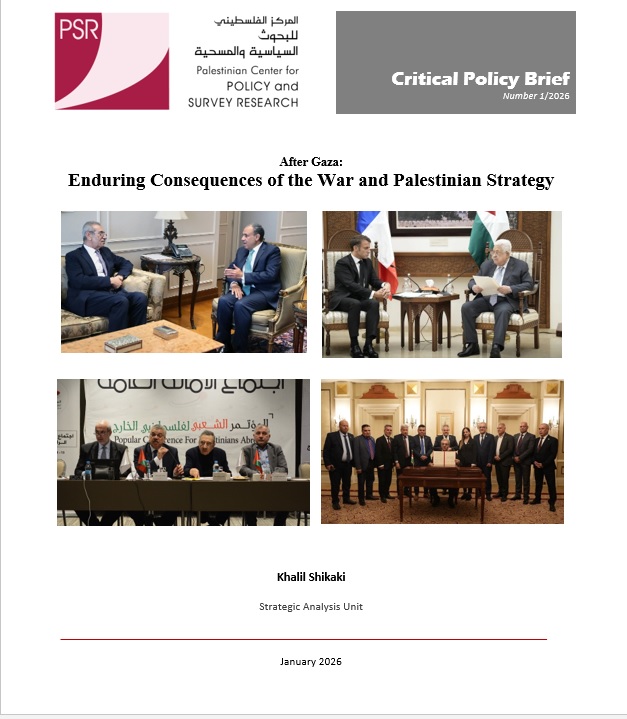26 January 2026
Report I: Governance and the Domestic Balance of Power after Two Years of War on the Gaza Strip
Gaza War reshaped Palestinian society: priorities shifted from growth to basic services; trust mixed but satisfaction fell; civil liberties eroded. Public still values democracy yet increasingly favors a strong leader who can deliver stability. Politically, Fatah's support has collapsed, while Hamas has maintained its base, but the largest group is the politically alienated. Social norms grew more conservative. This landscape signals a deep crisis of governance and a public desire for new leadership. 
8-26 October 2025
These are summary findings from the latest....More
A joint public opinion survey from July 2024 finds that October 7th and the current war produce massive fears of genocide, overwhelming mutual distrust and dehumanization; the events reduce support for a two-state peace solution among Israeli Jews while increasing it among Palestinians, but still only a minority support it on each side. Over 60 percent on both sides prefer a regional peace based on a two-state solution and normalization if the alternative is a regional, multi-front war. Incentives remain capable of reversing the hardline views producing strong majorities among both sides for a peace package that permanently ends the conflict 
Summary Report  Table of findings
Table of findings DS presentation
DS presentation KS presentation
KS presentation NR presentation
NR presentation
These are the results of Palestinian-Israeli Pulse: ....More
28 October 2025
A Dual Crisis- Palestinian Public Opinion Amidst Occupation and a Leadership Vacuum:
Palestinian opinion is polarized: the Trump Plan is widely known but support is split, with Gazans more favorable than West Bankers. Majorities back Hamas’s response yet reject disarming Hamas; most doubt the plan will end the war or deliver statehood. A leadership crisis endures—dissatisfaction with Abbas and the PA, Marwan Barghouti leading, and Hamas outpolling Fatah. Since Oct 7, support for the attack persists even as expectations of Hamas victory wane. Gazans are more open to negotiated arrangements;` West Bankers favor armed struggle. Across both, skepticism of external plans coexists with demands for elections and self-defense.
22-25 October 2025

These are the results of the latest poll conducted by PCPSR-Polling and Survey Research in the West Bank and the Gaza Strip between 22-25 October 2025. The immediate period prior to the poll witnessed the announcement of the Trump Plan at the end of September followed by a ceasefire agreement between Hamas and Israel based on that plan. Few days before the conduct of the poll interviews, Israeli hostages were and Palestinian hostages were released by Hamas and Israel respectively. Israel allowed humanitarian aid to enter the Gaza Strip and president Trump announced the end of the two-year Gaza War. Meanwhile, conditions in the West Bank continued to deteriorate due to increased settler violence. ....MORE
Favorability of the October 7 attack, the belief that Hamas will win the war, and support for Hamas continue to decline, but the overwhelming majority is opposed to Hamas disarmament and does not believe that release of the hostages will bring an end to the war. Nonetheless, about half of Gazans support the anti-Hamas demonstrations and almost half want to leave the Gaza Strip if they could. Support for the two-state solution remains unchanged but support for armed struggle drops
1-4 May 2025
This poll has been conducted in cooperation with the Netherland Representative Office in Ramallah
These are the results of the latest poll conducted by the Palestinian Center for Policy and Survey Research (PSR) in the West Bank and the Gaza Strip between 1-4 May 2025. The period prior to the poll witnessed the continuation of the war on the Gaza Strip and the failure of all attempts to reach a new ceasefire after ....More
For the first time since October 7, 2023, simultaneously in the West Bank and the Gaza Strip, findings show significant drop in the favorability of the October 7 attack and in the expectations that Hamas will win the current war, and a moderate drop in the level of support for Hamas; moreover, findings show a drop in the Gaza Strip in the preference for a continued Hamas control over that area in the day after the war and a rise in the preference for PA control. Nonetheless, despite all that, support for Hamas remains the highest compared to all Palestinian factions. Furthermore, findings show significant rise in support for the two-state solution accompanied by a drop in the preference for armed struggle and a rise in the preference for negotiations as the best means of ending the Israeli occupation. 
3-7 September 2024
These are the results of the latest poll conducted by the Palestinian Center for Policy and Survey Research (PSR) in the West Bank and the Gaza Strip between 3-7 September 2024. The period prior to the poll witnessed the continuation of the war on the Gaza Strip and the failure of all attempts to reach a ceasefire. Talk about the “day after” continued without.....More

